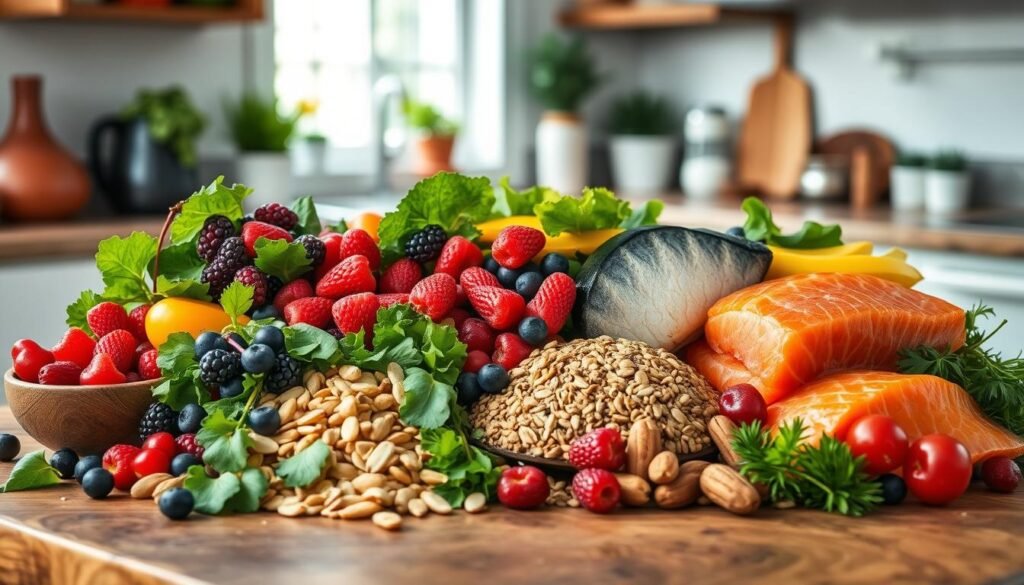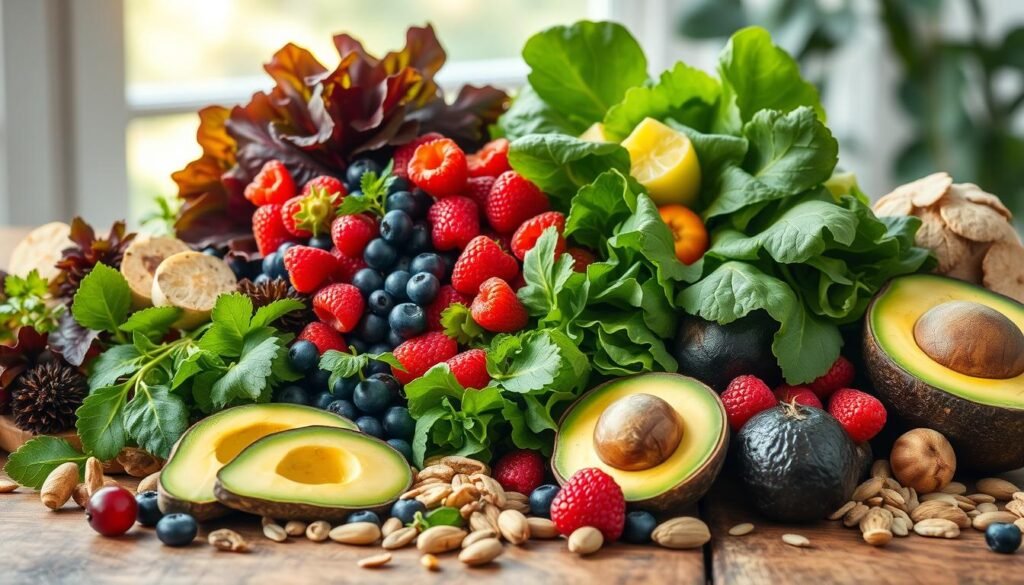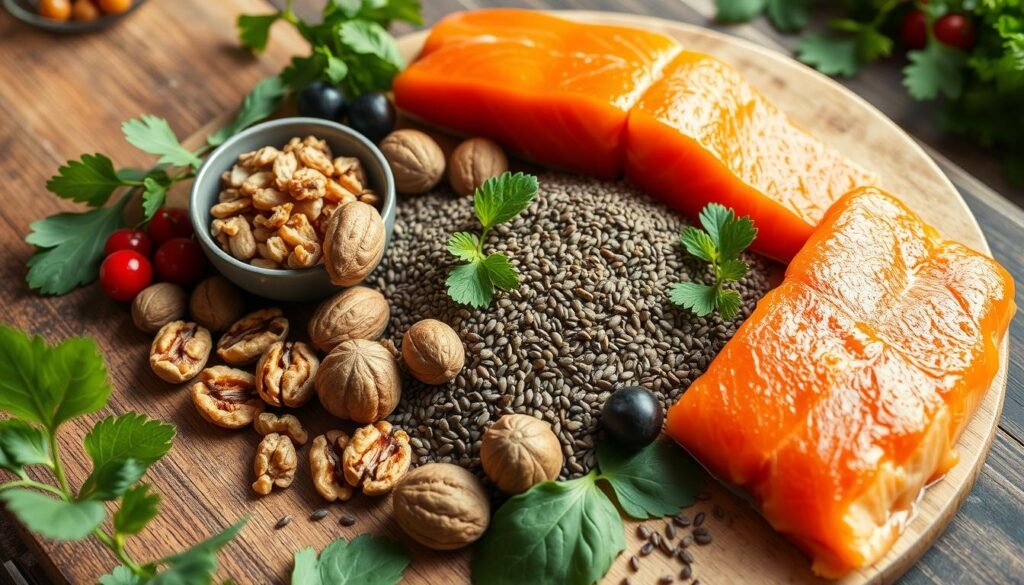Did you know a large number of women with Polycystic Ovary Syndrome (PCOS) struggle with overweight or obesity? This overlap shows the need for focused eating plans in PCOS care. The right food choices are crucial for easing symptoms and restoring hormonal balance. They support overall health too. Foods that cause inflammation can make PCOS worse, leading to insulin problems, irregular periods, and weight gain.
Clinical dietitian Amanda Stathos recommends a diet low in inflammation. It should be full of whole, unprocessed foods like omega-3s from fish and lots of leafy greens. This approach can massively improve symptoms and well-being for PCOS sufferers. The article will discuss top anti-inflammatory foods for effective PCOS management. It shows how small food changes can bigly affect inflammation and hormone health.
Key Takeaways
- Polycystic Ovary Syndrome (PCOS) affects millions of women, many also battling overweight.
- An anti-inflammatory diet can ease PCOS symptoms.
- Adding omega-3 fatty acids to your diet is vital for hormone balance.
- Eating whole, unprocessed foods is crucial for fighting inflammation.
- Smart food choices may improve insulin resistance and boost health.
- Exercise and healthy living enhance well-being, along with diet.
Understanding Polycystic Ovary Syndrome (PCOS)
Polycystic Ovary Syndrome affects about 15% to 18% of women in their childbearing years. It’s known for causing hormonal imbalances. Symptoms include irregular periods, excessive hair growth, and ovarian cysts. Insulin resistance is also a key factor in PCOS, leading to issues like high blood pressure and diabetes.
Characteristics and Symptoms
Women with Polycystic Ovary Syndrome face various symptoms that affect their life. These symptoms include:
- Acne and skin issues
- Hirsutism (excess hair growth)
- Irregular or absent menstrual periods
- Weight gain or obesity
Research shows up to 80% of those with PCOS have insulin resistance. This condition raises insulin levels in the blood. It can also increase testosterone, causing acne and irregular periods. Ethnic differences exist, as Mexican American women have more insulin resistance than Caucasian American women.
Inflammation is another big issue with PCOS. Being overweight changes how certain inflammation-related substances are released. Long-term exposure to androgens also harms the body, leading to mitochondrial problems. Understanding these issues is crucial. Changing your diet and lifestyle can help manage PCOS symptoms. For more on nutrition and PCOS, check out expert advice here.
How Diet Impacts PCOS and Inflammation
Diet plays a big role in managing PCOS by affecting insulin and inflammation. Eating right is key for those dealing with Polycystic Ovary Syndrome. Foods full of nutrients and low in inflammation can improve health and hormone levels.
The Relationship Between Diet and Hormones
A good diet is important for keeping PCOS in check. It should include:
- Lean proteins: They’re good for muscles and metabolism.
- Whole grains: Important for keeping blood sugar steady, which helps with insulin issues.
- Healthy fats: Things like avocados and nuts can make inflammation lower.
Women with PCOS often do better eating foods that don’t spike insulin. Low-glycemic options are best for this. Eating fish with omega-3 twice a week can also help with inflammation and periods.

Exercise is super important too. About 150 minutes of activity each week fights against insulin resistance. Changing your diet and exercising regularly can make a big difference. The Mediterranean diet is especially effective for weight loss and metabolic health in PCOS.
| Diet Element | Benefits |
|---|---|
| Lean Proteins | Support muscle maintenance and metabolic function |
| Whole Grains | Help stabilize blood sugar levels |
| Healthy Fats | Reduce systemic inflammation |
| Omega-3 Rich Foods | Help regulate menstrual cycles and reduce inflammation |
Sticking to a diet that focuses on these elements can promote a healthier life for those with PCOS.
What Are Anti-Inflammatory Foods?
Anti-inflammatory foods are key to staying healthy, especially if you have Polycystic Ovary Syndrome (PCOS). These foods fight inflammation, which is linked to many PCOS symptoms. Adding them to your daily diet can lessen inflammation and boost your overall health.
Foods That Reduce Inflammation
Eating a variety of anti-inflammatory foods can greatly improve your health and help with PCOS. Important types of these foods include:
- Fruits and Vegetables: They’re full of antioxidants. Foods like berries, greens, and tomatoes can reduce inflammation.
- Whole Grains: Quinoa, brown rice, and whole-wheat bread have lots of fiber. They help control insulin levels.
- Lean Proteins: Fish, chicken, and plant proteins support muscles and aid in weight control.
- Healthy Fats: Olive oil, nuts, and fatty fish are good for the heart and lowering inflammation.
Focus on these food groups to manage PCOS better through diet. It’s important to balance your meals and avoid foods like refined carbs and sugar that worsen insulin resistance. For more about how food affects PCOS, check out this article.
Best Anti-Inflammatory Foods to Help Manage PCOS Effectively
Choosing the right foods is key to handling polycystic ovary syndrome (PCOS) effects. Eating well helps reduce inflammation and balance hormones. This is important for anyone dealing with this widespread endocrine issue. Here are some top food choices that are great for PCOS.
Top Food Choices for PCOS
Here are the top anti-inflammatory foods for managing PCOS symptoms:
- Omega-3 Rich Fish: Foods like salmon and mackerel are packed with omega-3s that fight inflammation.
- Non-Starchy Vegetables: Veggies such as leafy greens, broccoli, and bell peppers are full of nutrients and antioxidants.
- Full-Fat Dairy (in moderation): Options like yogurt and cheese offer both calcium and healthy fats.
- Legumes: Beans and lentils are great sources of fiber and protein, making them healthy carb options.
- Whole Grains: Foods like quinoa, brown rice, and oats help keep energy up and blood sugar stable.
- Berries: Berries such as blueberries and strawberries are loaded with antioxidants to help fight inflammation.
- Nuts: Almonds and walnuts are filled with nutrients and healthy fats that make you feel full.

The Mediterranean diet is often recommended for those with PCOS. It focuses on whole foods, lean proteins, and healthy fats. It is key for achieving and keeping a healthy weight. This is very important for effective PCOS management. Adding these top foods for PCOS to your diet improves overall health. It also helps lower the risk of further complications.
Role of Omega-3 Fatty Acids in PCOS Management
Omega-3 fatty acids are key nutrients that help women with polycystic ovary syndrome (PCOS). They improve hormonal health, which is crucial for those with PCOS. Eating foods rich in omega-3s can boost metabolic function and hormone regulation.
Benefits of Omega-3s for Hormonal Health
Studies show omega-3 fatty acids are great for PCOS management. They enhance insulin sensitivity, lowering HOMA index scores. Plus, they reduce cholesterol and triglyceride levels, important for women facing metabolic issues from PCOS.
Omega-3s also raise adiponectin levels. This protein helps with glucose control and breaking down fats. Since up to 70% of overweight women with PCOS have insulin resistance, omega-3s could be especially beneficial.
Foods like fatty fish, flaxseeds, and walnuts are full of omega-3s. They’re good for a PCOS diet, helping with metabolism and reducing inflammation. This supports overall hormonal health.
| Benefit | Impact on PCOS Management |
|---|---|
| Improvement in Insulin Sensitivity | Enhanced metabolic health and lower risk for diabetes |
| Lower Total Cholesterol | Reduced cardiovascular risks associated with PCOS |
| Decreased Triglyceride Levels | Improved lipid profiles contributing to better hormonal balance |
| Increased Adiponectin | Improved glucose metabolism and fatty acid breakdown |

Benefits of Fiber-Rich Foods for Hormone Balance
Fiber-rich foods are key for women with PCOS. They help manage hormone levels. By eating foods like fruits and veggies, you improve your metabolic health. This makes your hormones more stable and helps your overall health.
Importance of Dietary Fiber
Eat more legumes, whole grains, fruits, and vegetables to digest food better. These slow down how fast your body absorbs sugar. It’s great for reducing insulin resistance. A diet high in fiber can also help you manage your weight and lower body fat.
Here are some fiber-rich foods to add to your meals:
- Legumes (e.g., lentils, chickpeas, black beans)
- Whole grains (e.g., quinoa, brown rice, oats)
- Fruits (e.g., berries, apples, bananas)
- Vegetables (e.g., broccoli, spinach, carrots)
| Type of Fiber-Rich Food | Dietary Fiber Content (per serving) | Health Benefits |
|---|---|---|
| Lentils | 15.6g | Improves digestion, stabilizes blood sugar |
| Quinoa | 5.2g | Aids in weight management, promotes fullness |
| Berries | 8g | Rich in antioxidants, supports heart health |
| Broccoli | 2.4g | Boosts immune health, reduces inflammation |
Making fiber-rich foods a regular part of your diet is vital. They don’t just manage PCOS symptoms. They also enhance your overall wellness. These foods are essential for hormone balance. They’re a major part of staying healthy.
Incorporating Antioxidants for Reducing Inflammation
Antioxidants are key in reducing inflammation. They fight oxidative stress, which is crucial for women with Polycystic Ovary Syndrome (PCOS). PCOS affects about 5 to 10 percent of women of childbearing age. It leads to serious metabolic problems. Adding antioxidants to their diet can really help their health and hormone balance.
Benefits of Antioxidants
Berries, dark chocolate, and greens like kale and spinach are packed with antioxidants. Eating these foods regularly can greatly improve health. Women with PCOS usually have higher levels of C-reactive protein (CRP) and malondialdehyde (MDA). This shows they have more oxidative stress. Their total antioxidant status (TAOS) is often lower than in healthy women. This puts them at risk for more PCOS complications.
Eating foods rich in antioxidants helps with metabolic health and managing PCOS. Alpha-lipoic acid (ALA), for example, can make insulin work better. It may also help regulate menstrual cycles. When ALA is combined with inositol, the results can be very beneficial.
Vitamins E and C are powerful antioxidants. They turn on important antioxidant enzymes inside cells. This helps reduce oxidative stress and protects cells. By eating a variety of colorful foods, people can improve their health and hormone levels. For more tips on managing PCOS, check out this resource.
Foods to Avoid to Minimize Inflammation
When it comes to Polycystic Ovary Syndrome (PCOS), what you eat matters a lot. Certain foods to avoid help in reducing inflammation. This is key to improving your health. Foods that cause inflammation can make PCOS symptoms worse. So, it’s important to know these foods and eat less of them. This is part of following a good PCOS diet.
Reducing Inflammatory Foods
For those dealing with PCOS, it’s key to be careful about certain foods that might cause more inflammation.
- Processed Foods: They have a lot of unhealthy fats and sugars. This can increase insulin levels, causing more problems.
- Sugary Snacks: These sweets have a lot of refined sugars. They can make blood sugar levels spike, which is bad for insulin resistance.
- Refined Carbohydrates: Foods like white bread and pastries have a high Glycaemic Index (GI). This can mess with your blood sugar levels.
- Fried Foods: These foods have bad fats that can increase estrogen. This makes PCOS symptoms worse.
- Dairy Products: Some dairy can raise Insulin Growth Factor 1 (IGF-1) levels. This is not good for your hormone balance.
Your food choices have a big impact on inflammation in your body. Research shows eating too many saturated and trans fats can lead to more insulin resistance and inflammation. To avoid this, choose foods that are rich in nutrients. Pick whole and healthy food options.
Moving to a PCOS diet full of anti-inflammatory foods is a good step. It helps with hormone regulation and lowers symptoms. Eating fewer harmful foods can really improve your health and well-being. This lets people with PCOS live better lives.
Conclusion
Managing Polycystic Ovary Syndrome (PCOS) requires a well-rounded plan. This includes diet changes, lifestyle shifts, and ongoing care. An anti-inflammatory diet is key. It helps balance hormones and reduce PCOS inflammation.
Eating foods like fatty fish, nuts, berries, and leafy greens is beneficial. They improve health and target PCOS symptoms.
To aid PCOS management, eating fiber-rich foods and healthy fats is advised. Watch your carb intake too. These changes boost insulin sensitivity and regulate hormones.
Adopting a healthy lifestyle is also vital. It should involve regular exercise and mindful eating. These practices can greatly enhance your overall health.
While PCOS can’t be fully cured, smart food choices and a positive attitude can make a difference. Focusing on an anti-inflammatory diet and a whole-person approach helps with PCOS. It improves life quality.